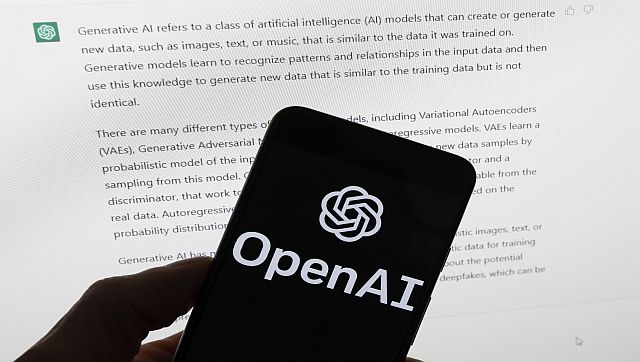Several well-known novelists, including George RR Martin, the author behind the hugely successful Game of Thrones franchise, have joined the court battle against OpenAI over its chatbot technology. They allege that OpenAI has used their books to train ChatGPT and other AI models. Here’s the whole story. Writers legal action against OpenAI A trade group for US authors has sued OpenAI in Manhattan federal court on behalf of prominent writers including John Grisham, Jonathan Franzen, George Saunders, Jodi Picault and Game of Thrones novelist George RR Martin, accusing the company of unlawfully training its popular artificial-intelligence based chatbot ChatGPT on their work. The proposed class-action lawsuit filed late on Tuesday by the Authors Guild joins several others from writers, source-code owners and visual artists against generative AI providers. According to the authors’ complaint, OpenAI was accused of stealing their “works wholesale, without permission or consideration.” After being transferred, the data was utilised to train OpenAI’s massive language model. The lawsuit claims that pirated copies of the authors’ book were “fed” without permission “into the fabric of GPT 3.5 and GPT 4 which power ChatGPT and thousands of applications and enterprise uses — from which OpenAI expects to earn many billions,” the Authors Guild said, reports Rolling Stone. The complaint notes that these “authors’ livelihoods derive from the works they create. But Defendants’ LLMs (Large Language Models) endanger fiction writers’ ability to make a living, in that the LLMs allow anyone to generate — automatically and freely (or very cheaply) — texts that they would otherwise pay writers to create.” It added, “Moreover, Defendants’ LLMs can spit out derivative works: material that is based on, mimics, summarises, or paraphrases Plaintiffs’ works, and harms the market for them,” as per a report in News 18. The complaint, which was filed in united States District Court for the Southern District of New York, said that while OpenAI does not publicly announce which works it uses to train its models, the company has admitted to using copyrighted content, as per a New York Times report. The complaint further claimed that OpenAI’s ChatGPT is capable of providing book summaries that include details not found in reviews or elsewhere online, implying that the underlying programme was fed the books in their entirety. [caption id=“attachment_13151512” align=“alignnone” width=“640”] The complaint said ChatGPT generated accurate summaries of the authors’ books when prompted, indicating that their text is included in its database. AP[/caption] Douglas Preston, an author who joined the complaint, told the New York Times that when he asked ChatGPT to describe minor characters in his works and it returned comprehensive information that wasn’t available in the novels’ reviews or Wikipedia entries. “That’s when I looked at this and said, ‘My God, ChatGPT has read my books, how many of my books has it read?’” he said. “It knew everything, and that’s when I got a bad feeling.” ‘Preserve our literature’ In addition to Microsoft-backed OpenAI, similar lawsuits are pending against Meta Platforms and Stability AI over the data used to train their AI systems. Other authors involved in the latest lawsuit include The Lincoln Lawyer writer Michael Connelly and lawyer-novelists David Baldacci and Scott Turow. Representatives for OpenAI did not immediately respond to a request for comment on Wednesday. OpenAI and other AI defendants have said their use of training data scraped from the internet qualifies as fair use under US copyright law. Authors Guild CEO Mary Rasenberger said in a statement on Wednesday that authors “must have the ability to control if and how their works are used by generative AI” in order to “preserve our literature.” The Authors Guild’s lawsuit claims that the datasets used to train OpenAI’s large language model to respond to human prompts included text from the authors’ books that may have been taken from illegal online “pirate” book repositories. The complaint said ChatGPT generated accurate summaries of the authors’ books when prompted, indicating that their text is included in its database. It also cited growing concerns that authors could be replaced by systems like ChatGPT that “generate low-quality ebooks, impersonating authors and displacing human-authored books.” With inputs from Reuters
The complaint said ChatGPT generated accurate summaries of the authors’ books when prompted, indicating that their text is included in its database. AP[/caption] Douglas Preston, an author who joined the complaint, told the New York Times that when he asked ChatGPT to describe minor characters in his works and it returned comprehensive information that wasn’t available in the novels’ reviews or Wikipedia entries. “That’s when I looked at this and said, ‘My God, ChatGPT has read my books, how many of my books has it read?’” he said. “It knew everything, and that’s when I got a bad feeling.” ‘Preserve our literature’ In addition to Microsoft-backed OpenAI, similar lawsuits are pending against Meta Platforms and Stability AI over the data used to train their AI systems. Other authors involved in the latest lawsuit include The Lincoln Lawyer writer Michael Connelly and lawyer-novelists David Baldacci and Scott Turow. Representatives for OpenAI did not immediately respond to a request for comment on Wednesday. OpenAI and other AI defendants have said their use of training data scraped from the internet qualifies as fair use under US copyright law. Authors Guild CEO Mary Rasenberger said in a statement on Wednesday that authors “must have the ability to control if and how their works are used by generative AI” in order to “preserve our literature.” The Authors Guild’s lawsuit claims that the datasets used to train OpenAI’s large language model to respond to human prompts included text from the authors’ books that may have been taken from illegal online “pirate” book repositories. The complaint said ChatGPT generated accurate summaries of the authors’ books when prompted, indicating that their text is included in its database. It also cited growing concerns that authors could be replaced by systems like ChatGPT that “generate low-quality ebooks, impersonating authors and displacing human-authored books.” With inputs from Reuters
Why 'Game of Thrones' author, John Grisham and others are suing ChatGPT
FP Explainers
• September 21, 2023, 12:44:18 IST
According to the lawsuit, the authors, including RR Martin, John Grisham Jonathan Franzen, George Saunders, Jodi Picault, allege that OpenAI has used their books to train ChatGPT and other AI models
Advertisement
)
End of Article